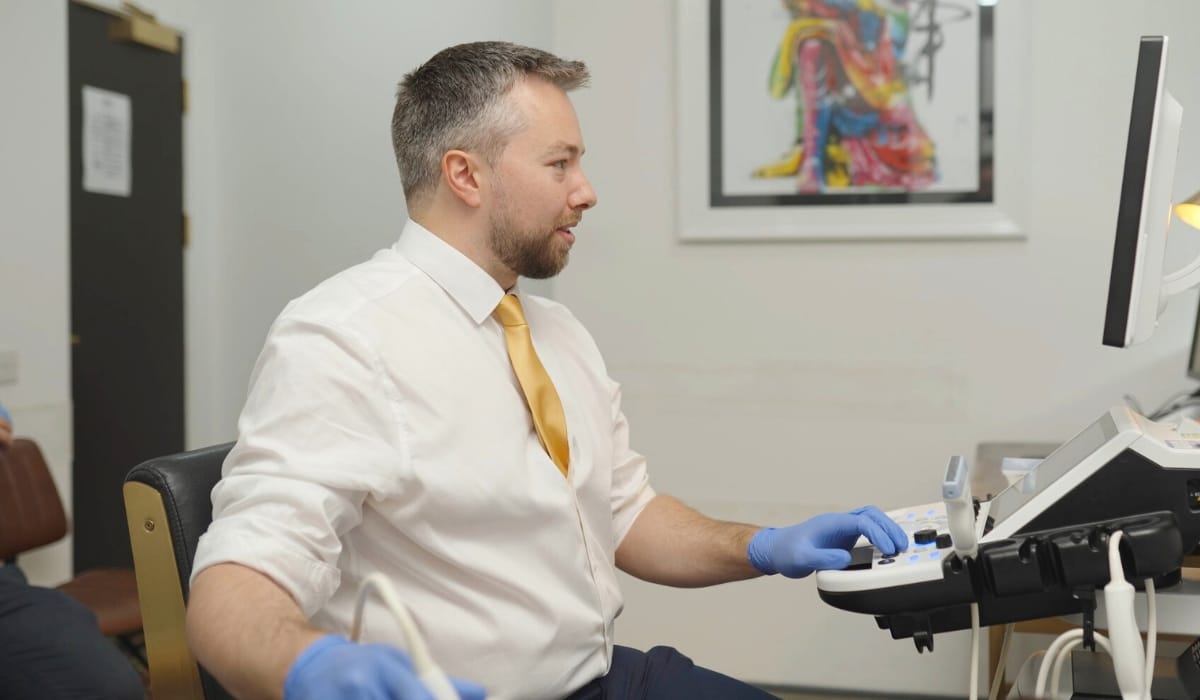Treatments, options and pricing
Browse and click below to book any of our available Paediatric Ultrasound Scans.
Paediatric Abdomen Ultrasound Scan
Included in the Paediatric Abdomen Ultrasound Scan
A paediatric abdominal ultrasound scan is a non-invasive and painless imaging test used to examine the organs and structures within a child’s abdomen.
It uses high-frequency sound waves to create real-time images of organs such as the liver, kidneys, bladder, spleen, pancreas, and intestines.
This scan helps diagnose conditions like abdominal pain, infections, organ enlargement, or congenital abnormalities.
It is commonly used in both emergency and routine evaluations and involves no radiation, making it a safe choice for children of all ages.
Paediatric Cranium/ Head Ultrasound Scan
Included in the Paediatric Cranium/ Head Ultrasound Scan
A paediatric cranial (head) ultrasound is a non-invasive imaging test used primarily in infants to examine the brain and surrounding structures.
It uses high-frequency sound waves to create images through the soft spots (fontanelles) in a baby’s skull, which haven’t yet closed.
This scan helps detect conditions such as hydrocephalus, brain haemorrhages, cysts, or congenital brain abnormalities.
It’s a safe, painless procedure commonly performed in premature babies or newborns with neurological concerns, without exposing them to radiation.
Paediatric Joint Ultrasound Scan Single Joint
Included in the Paediatric Joint Ultrasound Scan Single Joint
A paediatric joint ultrasound scan is a safe, non-invasive imaging technique used to assess joint health in children.
It utilises high-frequency sound waves to produce real-time images, allowing doctors to evaluate joint structures, detect fluid buildup, inflammation, or abnormalities in soft tissues and cartilage.
Commonly used to diagnose conditions like juvenile arthritis, joint infections, or injuries, it’s especially useful in younger children as it requires no radiation or sedation.
Frequently scanned joints include the knees, ankles, and wrists.
Paediatric Thyroid Ultrasound Scan
Included in the Paediatric Thyroid Ultrasound Scan
A paediatric thyroid ultrasound scan is a safe, non-invasive procedure used to evaluate the thyroid gland in children.
Using high-frequency sound waves, it produces detailed images of the thyroid’s size, shape, and structure, helping to identify abnormalities such as nodules, cysts, inflammation, or enlargement (goitre).
It’s often performed when there are concerns about thyroid function, swelling in the neck, or a family history of thyroid disease.
The scan is painless, quick, and does not involve any radiation, making it ideal for children.
Paediatric Testes/Scrotum Ultrasound Scan
Included in the Paediatric Testes/Scrotum Ultrasound Scan
A paediatric testicular (or scrotal) ultrasound is a safe, non-invasive imaging test used to assess the testes and surrounding scrotal structures in children.
It uses high-frequency sound waves to produce detailed images, helping to evaluate issues such as pain, swelling, undescended testes, torsion (twisting), hydrocele, hernia, or masses.
This scan is especially important in emergencies like testicular torsion, where prompt diagnosis can preserve testicular function.
The procedure is painless, radiation-free, and typically completed quickly, making it well-suited for use in children.
Paediatric Chest Ultrasound Scan (Not Heart)
Included in the Paediatric Chest Ultrasound Scan (Not Heart)
A paediatric chest ultrasound (excluding the heart) is a non-invasive imaging technique used to evaluate the lungs, pleura, and chest wall in children.
It is particularly useful for detecting pleural effusions, lung consolidations, infections, and chest wall abnormalities. Unlike X-rays or CT scans, ultrasound does not use ionising radiation, making it safer for repeated use in young patients.
It is often used at the bedside for rapid diagnosis and monitoring of respiratory conditions, especially in critically ill or newborn infants.
Paediatric Lump and Bumps Ultrasound Scan
Included in the Paediatric Lump and Bumps Ultrasound Scan
A paediatric lump and bumps ultrasound is a safe, non-invasive imaging test used to assess soft tissue swellings, lumps, or masses in children.
It helps distinguish between cystic (fluid-filled), solid, or inflamed areas, and can guide further management or the need for biopsy.
Common reasons for this scan include lymph node enlargement, abscesses, cysts, lipomas, or trauma-related swellings.
Since it uses sound waves and no radiation, it is ideal for children and can often be performed quickly and painlessly in a clinic or hospital setting.
Paediatric Joint Ultrasound Scan Two Joints
Included in the Paediatric Joint Ultrasound Scan Two Joints
A paediatric joint ultrasound scan is a safe, non-invasive imaging technique used to assess joint health in children.
It utilises high-frequency sound waves to produce real-time images, allowing doctors to evaluate joint structures, detect fluid buildup, inflammation, or abnormalities in soft tissues and cartilage.
Commonly used to diagnose conditions like juvenile arthritis, joint infections, or injuries, it’s especially useful in younger children as it requires no radiation or sedation.
Frequently scanned joints include the knees, ankles, and wrists.
Common Q&A about Private Paediatric Ultrasound Scan Services
Our FAQ section is designed to address common questions you may have, from how our treatments work to what you can expect during and after your session.
Our team is always available to provide additional support if you need more personalised guidance, ensuring that you feel informed and confident every step of the way.
Yes! Ultrasounds are completely safe as they use sound waves instead of radiation, making them ideal for children.
No, ultrasounds are non-invasive and painless. Your child may feel a cool sensation from the gel applied to their skin.
Most scans take 20 to 30 minutes, depending on the area being examined.
Yes, parents or guardians are encouraged to stay with their child to provide reassurance and comfort.
We offer same-day or next-day appointments whenever possible, ensuring you get answers quickly.
No, a GP referral is not required to book an ultrasound at The Health Suite Leicester.
If any concerns are identified, we will provide a detailed report and discuss the next steps, including referrals if necessary.
Loose-fitting, comfortable clothing is recommended. Depending on the area being scanned, certain clothing adjustments may be needed.
Ultrasound is an excellent diagnostic tool but may not detect every condition. If further investigation is needed, we will guide you on the appropriate next steps.
You can book online, call our clinic, or visit us in person. Contact us today for rapid, expert care!
Advice from the experts
Read clear, expert advice from our clinicians, offering trusted advice, clinical insight, and practical guidance to help you understand your treatment and care options.
Symptom checker
If you are experiencing any of these symptoms, please book an appointment with us. Symptoms can vary from person to person and from condition to condition.A proper diagnosis can only be made through a thorough medical examination.
Our clinicians will carry out a full assessment to ensure an accurate diagnosis and appropriate care.
Does your child have persistent abdominal pain or tummy discomfort?
Abdominal ultrasound helps assess organs like the liver, kidneys, bladder and intestines to find causes of pain, swelling or digestive issues.
Is there swelling, a lump or bump you’re worried about?
Ultrasound of soft tissues and lumps can identify cysts, lymph node enlargement, abscesses or other abnormalities safely and painlessly.
Has your child’s scrotum or testes been painful, swollen or abnormal?
A paediatric testes/scrotum scan examines testicular health, checking for torsion, hydrocele, undescended testicles, hernias or masses.
Are there concerns about joints or mobility due to pain or swelling?
Joint ultrasound evaluates knee, ankle, wrist and other joints for inflammation, fluid, injury, or structural issues affecting activity and comfort.
Does your baby have neurological risk or need a head check?
Cranium or head ultrasound in infants assesses the brain and skull — especially useful before fontanelle closure for conditions like hydrocephalus or cysts.
Is there unexplained chest or respiratory discomfort?
Chest ultrasound (excluding heart imaging) can detect fluid, lung or chest wall issues without radiation, offering quick insight into respiratory concerns.
What we treat
At The Health Suite Leicester, our private medical clinic offers expert care whenever you need it. Our team of experienced GPs and healthcare professionals provide personalised diagnosis and treatment for a wide range of medical conditions, ensuring high-quality, professional care in a comfortable setting.
Click below to view useful info on a few of the common conditions we treat:
Abdominal organs and pain
Detects issues in liver, kidneys, intestines, bladder or spleen to support diagnosis and treatment planning.
Testes and scrotal concerns
Safe imaging to assess testicular problems like torsion, hydrocele, undescended testes or masses.
Cranial/Head scans for infants
Evaluates the infant brain and skull via the fontanelle for haemorrhage, hydrocephalus or congenital changes.
Joint inflammation & injury
Assesses fluid, inflammation, cartilage or soft tissue around joints such as knees, wrists and ankles.
Soft tissue lumps & bumps
Distinguishes between cysts, abscesses, and other soft tissue abnormalities.
many more
Our clinicians manage a broad spectrum of conditions, and individual assessment allows us to tailor care beyond the examples listed. We encourage you to book a consultation to discuss your symptoms and appropriate treatment options.





